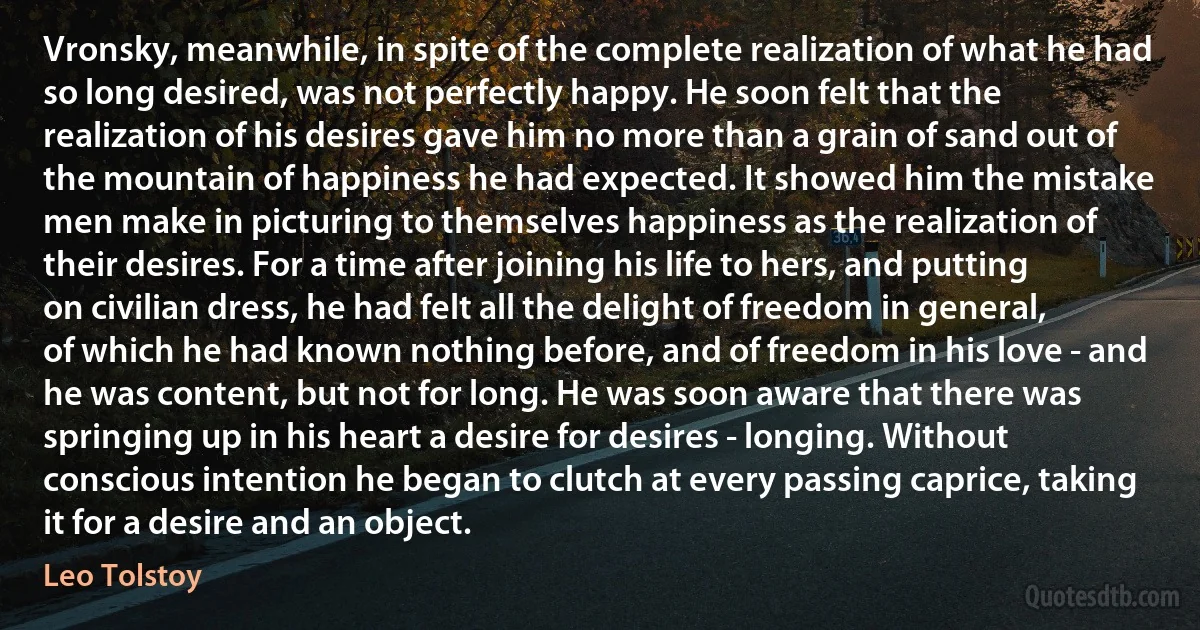
Vronsky, meanwhile, in spite of the complete realization of what he had so long desired, was not perfectly happy. He soon felt that the realization of his desires gave him no more than a grain of sand out of the mountain of happiness he had expected. It showed him the mistake men make in picturing to themselves happiness as the realization of their desires. For a time after joining his life to hers, and putting on civilian dress, he had felt all the delight of freedom in general, of which he had known nothing before, and of freedom in his love - and he was content, but not for long. He was soon aware that there was springing up in his heart a desire for desires - longing. Without conscious intention he began to clutch at every passing caprice, taking it for a desire and an object.
Leo TolstoyRelated topics
begin caprice civilian content delight desire dress felt freedom general grain happiness happy heart hers men known life love meanwhile mistake mountain nothing passing picturing putting realization sand taking timeRelated quotes
The knower is the Purusa (the conscious principle) who cognizes the reflection from the Will-to-know by conjunction. The knowable consists of all the characteristics present in the essence of the Will-to know. This, then the knowable behaves like a magnet. It is useful only when placed here. On account of its capacity of knowability, it becomes the possession of the lord, the Purusa, who is of the nature of power of knowing. It becomes the object of the act of enjoyment, in as much as although by nature independent, it becomes dependent on another, existing as it does for fulfilling the object of that other.... The conjunction therewith is the cause, by giving that up is secured the complete remedy of pain, in as much as that is found to be the cause of removal the real thing, the cause of pain.

Vyasa
After all human beings have to live dogs too so as not to know that time is passing, that is the whole business of living to go on so they will not know that time is passing, that is why they get drunk that is why they like to go to war, during a war there is the most complete absence of the sense that time is passing a year of war lasts so much longer than any other year. After all that is what life is and that is the reason there is no Utopia, little or big young or old dog or man everybody wants every minute so filled that they are not conscious of that minute passing. It's just as well they do not think about it you have to be a genius to live in it and know it to exist in it and express it to accept it and deny it by creating it.

Gertrude Stein
Let me rule out at once any God who has personally spoken to anyone or issued instructions to men. That some men believe they have been spoken to by God, I am certain. That's for them to believe. I don't believe Moses came down from the mountain with any tablets he did not go up with. I believe mankind in general has a need to believe in higher powers and an existence not limited to the physical duration of the body. But these needs are hopes, and believing them doesn't make them true. I believe mankind feels a need to gather in churches, whether physical or social. I've spent hours and hours in churches all over the world. I sit in them not to pray, but to gently nudge my thoughts toward wonder and awe. I am aware of the generations there before me and the reassurance of tradition.

Roger Ebert
I have long known of Mr. Shaw, read his plays and prefaces, and loved him. I admire heroic effort. Accomplishment I love. What I am about to say is no invention, and I am putting it down for whatever it may be worth to the historian of literature and for the student of influences of men on men, and because it is true and must therefore be made known. As a boy, charging pell-mell through literature, reading everything I could lay hands on in the Public Library of Fresno, I found many men to whom I felt deeply grateful - especially Guy de Maupassant, Jack London, and H. L. Mencken - but the first man to whom I felt definitely related was George Bernard Shaw. This is a presumptuous or fatuous thing to mention, perhaps, but even so it must be mentioned.

William Saroyan
She believed herself to be completely normal. Two very simple reasons lay behind her decision to die, and she was sure that, were she to leave a note explaining, many people would agree with her.
The first reason: everything in her life was the same and, once her youth was gone, it would be downhill all the way, with old age beginning to leave irreversible marks, the onset of illness, the departure of friends. She would gain nothing by continuing to live; indeed, the likelihood of suffering only increased. The second reason was more philosophical: Veronika read the newspapers, watched TV, and she was aware of what was going on in the world. Everything was wrong, and she had no way of putting things right - that gave her a sense of complete powerlessness.

Paulo Coelho
